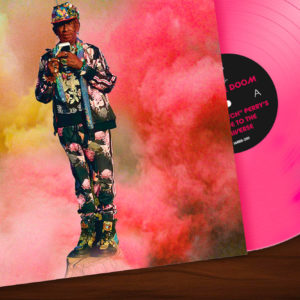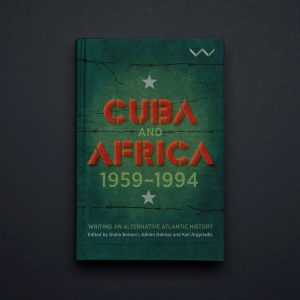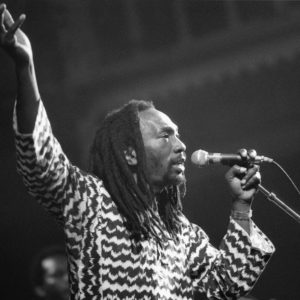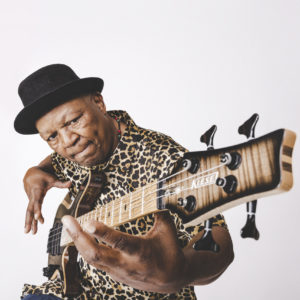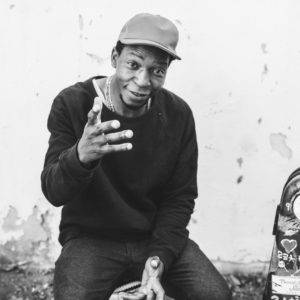Zamrock and psychedelic soul fuse on ‘Johnny!’
German funk legend Jan Weissenfeldt’s new album takes a decade on the road playing music from 1970s Africa and translates it into an explosive new sound.
Author:
14 January 2022
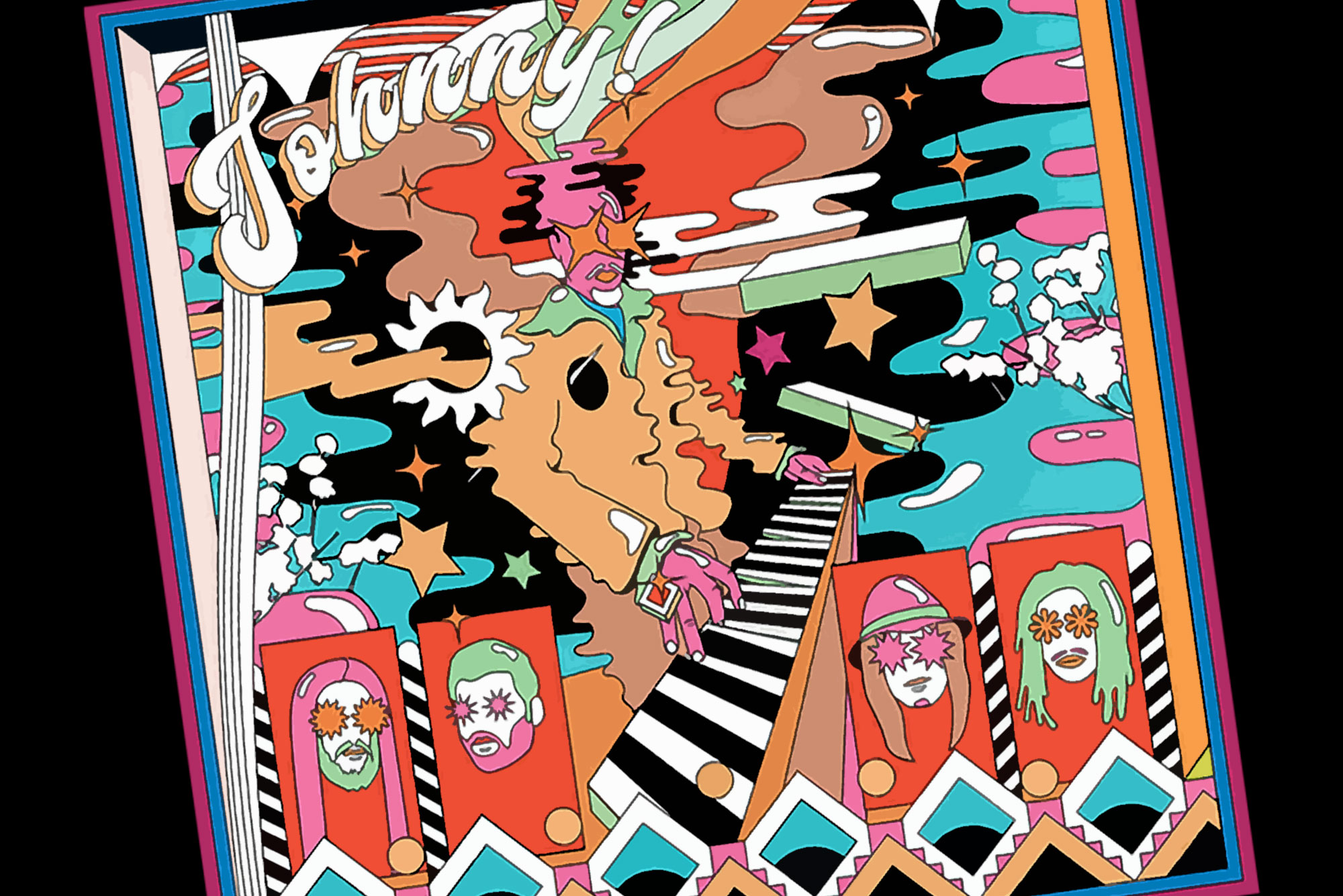
Jan Weissenfeldt has many names. Some may know the guitarist, bandleader and producer as JJ Whitefield, others as Karl Hector, while many may be familiar only with bands in which he has played, most notably The Poets of Rhythm, the Whitefield Brothers, Afrobeat Academy and Karl Hector & The Malcouns. Weissenfeldt is the kind of musician who sits in the background while his influence is everywhere.
He spent the past decade leading the bands of Ghanaian Ebo Taylor and Zambians Emanyeo Jagari Chanda and Rikki Ililonga, who all found fame on the African continent in the 1970s. A lack of international distribution stunted their rise at the time, but in 2010, when their albums were reissued globally, there was a sudden demand for this 40-year-old music – and Weissenfeldt was there to help revive it.
As a member of the band Afrobeat Academy, he recorded and toured with Taylor between 2009 and 2012, before touring with Chanda and Ililonga with the band Karl Hector & The Malcouns. These two multi-year stints as a backing band give important context for Weissenfeldt’s new album Johnny!, which was released in late October last year under the name Karl Hector Presents: Johnny!
Related article:
It was on tour with Taylor that Weissenfeldt met percussionist and singer Eric Owusu and Taylor’s son Henry, who joined the band on Johnny! The band also features Turkish drummer Bernd Oezsevim and Indonesian multi-instrumentalist Tomi Simatupang. On the album’s press release, Weissenfeldt credits his tours with Zamrock godfathers Ililonga and Chanda as instrumental in creating the sonic backdrop for the album.
A listen through Johnny! makes these connections instantly clear. Weissenfeldt’s album is a high-octane dose of fuzzed-out funk-rock and psychedelic soul that draws its influence directly from the rich legacies of Taylor, Chanda and Ililonga’s groundbreaking music of the 1970s.
Ebo Taylor’s comeback
Ghanaian guitarist, composer and producer Ebo Taylor was a driving force in West African music in the 1970s, with a sound that drew from highlife, Afrobeat, jazz and funk. But his music was released on small Ghanaian labels such as Gapophone Records, Essiebons and Pan African Records. He even released the music himself on his own Abookyi Records. He never received international distribution. This meant that while Taylor was a celebrated icon across Africa, in the West his music was the preserve of the collector.
That changed on New Year’s Day 2010, when Taylor, then aged 74, released his first international record, Love & Death, on global jazz and funk record label Strut Records.
Since 1999, Strut has been putting out well-received reissues of African records, including New York – Addis – London, a compilation of Ethiopian jazz artist Mulatu Astatke’s music, and Tony Allen’s great albums with Africa 70 such as No Accommodation For Lagos and Jealousy.
Related article:
Strut was also responsible for the popular Nigeria 70 compilations, which brought African stars such as Orlando Julius, Sir Victor Uwaifo, Segun Bucknor and the Lijadu Sisters to a Western audience decades after their heyday.
For many listeners who had never heard Taylor before, Love & Death was a revelation. Strut followed it in 2011 with a compilation, Life Stories, of Taylor’s best work from the 1970s.
With this new spotlight on both his contemporary and past work, Taylor’s global popularity surged, and he became a touring musician again, backed by a collective from Berlin.
Berlin’s Afrobeat Academy
Five years before Taylor released Love & Death, a collective of seasoned musicians from various funk backgrounds came together in Berlin under the name Afrobeat Academy.
Drummer Ekow Alabi and bassist Patrick Fankowski from Kabukabu, Finnish multi-instrumentalist Jimi Tenor’s band, gave Afrobeat Academy its rhythm section. They were joined by Oghene Kologbo, a Nigerian guitarist who made his name with Fela Kuti’s Africa 70. Weissenfeldt’s band Karl Hector & The Malcouns supplied the rest of Afrobeat Academy’s members, including saxophonist Ben Abarbanel-Wolff, trumpeter Stu Krause and multi-instrumentalist Thomas Myland.
Related article:
Two years after Afrobeat Academy formed, they released their 2007 album Remember Fela Anikulapo Kuti, billed under Oghene Kologbo and Afrobeat Academy. It would be the collective’s only album, as in 2009 they would have a rather fortuitous meeting with Taylor, resulting in the band backing the Ghanaian on a global tour for four years and the release of both Love & Death and its follow up, 2012’s Appia Kwa Bridge, which featured Africa 70 veterans Tony Allen and Pax Nicholas.
Rediscovering Zamrock
At the same time that Weissenfeldt was leading Taylor’s backing band, Now-Again Records, the Los Angeles-based record label of his other band Karl Hector & The Malcouns, began reissuing records from Zambia.
Its particular focus was a brand of 1970s fuzz-rock that came about when a new generation of Zambian musicians influenced by James Brown, Jimi Hendrix, Cream, Jefferson Airplane and The Rolling Stones, fused rock with Zambian rhythms.
Now-Again’s first Zamrock reissue in 2010 was Lazy Bones!, the 1975 album of the Zambian band Witch, led by enigmatic frontman Chanda, followed by Dark Sunrise, a compilation of music by Ililonga and the band Musi-O-Tunya. A Witch boxset, We Intend To Cause Havoc!, and reissues of Musi-O-Tunya’s Wings of Africa (1975) and Ililonga’s Zambia (1975) and Sunshine Love (1976) came out in 2012.
Related article:
As Weissenfeldt was moving into the last year of his stint supporting Taylor as a member of Afrobeat Academy, Now-Again started putting together the idea of a touring band to back Chanda and Ililonga. The record label reached out to Weissenfeldt, whose Karl Hector & The Malcouns took the job.
I was at the band’s debut show at 2012’s Trans Musicales music festival in Rennes, France – the first Zamrock performance in 35 years – and managed to spend time with Chanda and Ililonga backstage.
The duo called the performance an opportunity to show to the world what they should have shown it “a long time ago”, saying it was like being born again. Ililonga said it was great that people felt their music was worth reviving, but he admitted that the moment was bittersweet as many of the friends with whom they had made the music had already died. “The guys that should be on the stage with us are no longer,” he said.
With the duo’s comrades missing on stage, Karl Hector & The Malcouns stepped into the vacuum and would continue to back Chanda and Ililonga for years to come.
Johnny!
Fans of Zamrock will find much to love on Johnny!. The early album highlight, Only Love (Odo Nkwa), pairs propellant percussion with a killer fuzzed-out guitar riff to create a fierce tune, while Kokoko, a high point later on the album, is a more boisterous Afrorock affair featuring some great wahwah guitar. I’m Gone offers up a psych-rock gem while Make It Right presents a perfect example of a space where Zamrock merges with psychedelic soul.
But the rewards are richest on the songs in which both Taylor’s influence and that of the Zamrock movement can be detected. Album opener Otan Nyen Eduro, which also closes the album in instrumental form, features fuzz-rock riffage over a slower, loping Afrobeat groove that won’t sound unfamiliar to fans of Hugh Masekela’s 1975 album The Boy’s Doin’ It, recorded in Lagos.
Related article:
Taylor’s influence also shines through on Me Di3 Ne Wo (You Belong To Me), which features alternating rhumba and fuzz-rock guitar over a powerful Afrobeat rhythm, while Yendi Agoro ups the fuzz-rock ante without sacrificing any of the groove, giving a sense of the power of which Weissenfeldt’s new band is capable. They must be incredible live.
The album’s stand-out track is the magnificent hybrid Agyenkw, which switches between passages of gorgeous psychedelic soul and aggressive fuzz-rock, creating the clearest vision of what is possible when the music of 1970s Ghana and Zambia is fused to create something entirely new.

